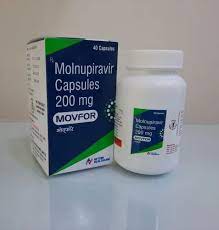molnupiravir 200 mg capsule
molnupiravir 200 mg capsule
Cipmolnu Capsules (Molnupiravir) are now available.
The COVID-19 infections caused by SARS-CoV-2 are treated with the antiviral medication Cipmolnu (Molnupiravir). Molnupiravir 200 mg capsule, sold under the brand names Molulife, Cipmolnu, and others, is a drug that stops the growth of several RNA viruses by inducing errors in viral RNA replication. Molnupiravir was first developed by Drug Innovation Ventures at Emory (DRIVE), a department of Emory University, to treat the flu. Ridgeback Biotherapeutics later acquired it owing to concerns about mutagenicity, and they worked with Merck & Co. to continue developing the medication. Additionally, Lagevrio is the brand name under which molnupiravir is sold.
In November 2021, the UK granted molnupiravir a license for use in placebo-controlled, double-blind, randomized clinical trials. For select populations when alternative medicines are unfeasible, molnupiravir was granted an emergency use authorization (EUA) by the US Food and Drug Administration (FDA) in December 2021. The EUA was barely approved (13–10) due to concerns about its effectiveness and the possibility that Molnupiravir's mutagenesis characteristics might create new variants that defy immunity and broaden the COVID–19 pandemic. The doses need to be taken as your doctor or another healthcare provider instructs. If you forget to take a dose, do so as soon as you remember, but if it is almost time for the next dose, skip the forgotten dose and continue taking the medicine.
Uses for Cipmolnu Capsules (Molnupiravir)
- Adults who have tested positive for the SARS-CoV-2 virus by direct testing and are at a high risk of developing severe COVID-19 sickness can use molnupiravir to treat mild to moderate COVID-19 illness.
- Use is not recommended when pregnant. There are no human usage data to evaluate the possibility of harmful effects on either the mother or the fetus during pregnancy. Given what we know right now, the medication may wreak havoc on the fetus. Organogenesis was associated with decreased fetal load, embryo-fetal mortality, and teratogenicity in rats and bunnies. Breastfeeding is not recommended during treatment since it may create negative responses in the newborn child. The existence of the medication or any of its metabolites in human milk is unknown. It is uncertain if it affects the newborn or the development of milk. Use in those under the age of 18 may have an impact on how ligaments and bones develop. Rats started showing damage to their bones after receiving many dosages.
- Molnupiravir has not been recommended for use during pregnancy since it was established during creature generation studies that it may damage fetuses when administered to pregnant people. Before prescribing molnupiravir, your doctor should do a pregnancy test, regardless of whether you suspect that you could be pregnant. The supplier should advise you against it given that you are having a child unless you have been expressly advised that the potential advantages outweigh the dangers.
- Additionally, breastfeeding should be avoided for four days after the last dosage of molnupiravir and during treatment. Women and men with "regenerative potential" should utilize contraception throughout treatment and for four days and around three months following the last dosage of molnupiravir, respectively.
contact: +91 97309 66532

Comments
Post a Comment